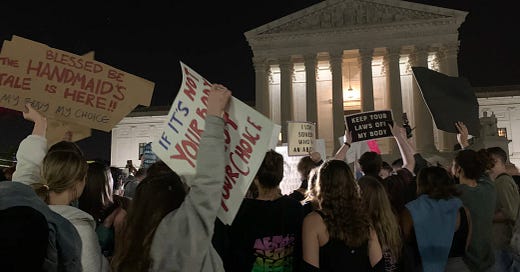Bonus 100: On the Legitimacy of Legitimacy Critiques
It's become increasingly common for the Supreme Court's defenders to attack critics for seeking to delegitimize the Court. But when are legitimacy critiques ... legitimate? I sketch out some thoughts.
Welcome back to the weekly bonus content for “One First.” Although Monday’s regular newsletter will remain free for as long as I’m able to do this, much of the bonus content is behind a paywall as an added incentive for those who are willing and able to support the work that goes into putting this newsletter together every week. I’m grateful to those of you who are already paid subscribers, and hope that those of you who aren’t will consider a paid subscription if and when your circumstances permit:
I was motivated to write about this week’s topic by three events in the past week—a debate that the Georgetown Student Chapter of the Federalist Society hosted last Wednesday night between Catholic U. law professor Jenn Mascott and me (video here); a speech that veteran Supreme Court practitioner Kannon Shanmugam gave at Duke Law School; and an editorial by the Wall Street Journal. All three included some variation on the same theme—criticism of at least some of the Supreme Court’s public critics (including, at least in the first example, me specifically) for criticizing the Court in a way that undermines the Court’s “legitimacy,” and that has, in the process, imperiled not only the rule of law in the abstract, but the justices’ personal safety.
There’s a lot to say about these arguments. In today’s bonus post, specifically, I want to try to put them into a broader context—one that starts by identifying how we ought to think about the source of the Court’s legitimacy; whether that legitimacy even can be eroded by external criticisms; and, if so, whether and to what extent critics have a responsibility to style their critiques in ways that don’t further undermine the Court’s legitimacy.
To make a long story short, I think these questions are all much more complicated than they might seem—and that these recent episodes have not just been frustratingly one-dimensional in their portrayals of critics, but have only scratched the surface of the deeper debate in which they’re necessarily taking a position. My own view is that the Court’s legitimacy comes principally from its own behavior; that external criticisms relate to that legitimacy only insofar as they are facilitating public understandings of that behavior; and that a critic’s obligation is not to avoid delegitimizing critiques altogether, but rather to be very clear about whether their critique is that the Court erred in some understandable (one might even say “legitimate”) way, or that the error was, and ought to be, delegitimizing.
For those who are not paid subscribers, the next free installment of the newsletter will drop on Monday morning. For those who are, please read on.
Keep reading with a 7-day free trial
Subscribe to One First to keep reading this post and get 7 days of free access to the full post archives.




